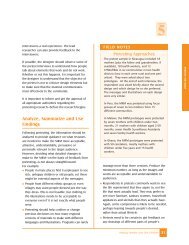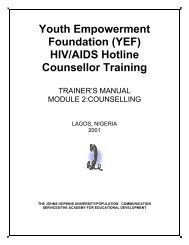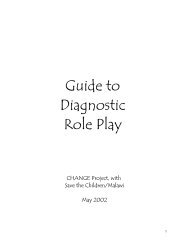MODULE TWO: COUNSELLING - FHI 360 Center for Global Health ...
MODULE TWO: COUNSELLING - FHI 360 Center for Global Health ...
MODULE TWO: COUNSELLING - FHI 360 Center for Global Health ...
You also want an ePaper? Increase the reach of your titles
YUMPU automatically turns print PDFs into web optimized ePapers that Google loves.
Special Guidelines 1<br />
•Suicide<br />
If someone tells you that s/he is contemplating suicide or shows signs of being<br />
suicidal, don't be afraid to talk about it. Your willingness to discuss suicide shows<br />
the person that you don't condemn him/her <strong>for</strong> having such feelings. Ask<br />
questions about how the person feels and the reasons <strong>for</strong> those feelings. It can<br />
be helpful <strong>for</strong> a person under stress to hear someone say, "You seem really<br />
down. Have you thought of killing yourself?"<br />
Also questions about suicide, about the idea itself. "Do you have a specific plan<br />
about how you would do it?" "Have you taken any steps to carry out the plan?"<br />
Determine whether the person has access to a gun or pills. The more specific<br />
and detailed the plan, the higher the risk. Don't worry that your discussion will<br />
encourage the person to go through with the plan. On the contrary, it will help<br />
him/her know that someone cares and is willing to be a friend.<br />
Be calm. Discuss suicide as you would any other topic of concern. Don't offer<br />
advice such as, "Think about how much better off you are than most people. You<br />
should appreciate how lucky you are." Such comments only increase feelings of<br />
guilt and make the suicidal person feel worse.<br />
Convey hope. Prevent isolation (tell the person that you are available). And<br />
recognise what you can't do <strong>for</strong> another person (you can't bring back a lover,<br />
talk someone out of depression, change someone's bad home life, or turn an<br />
ugly duckling into a swan).<br />
•Rape<br />
Often, just being able to talk about a crisis helps a person begin to let go of it. A<br />
woman who has been raped and is now able to talk about it needs to be<br />
encouraged to do so. Most likely she is feeling guilty and devastated by the act,<br />
so counsellors try to help her understand that she is not responsible <strong>for</strong> being<br />
sexually assaulted. Even if she did something unwise, such as walking through a<br />
park alone at night, she did not ask to be attacked and isn't to blame.<br />
Many sexual assault victims live in fear after an assault, and the fear becomes a<br />
controlling influence in their lives. Women need to know that all the reactions<br />
they are having--including fear--are normal. It can help to talk about options that<br />
will make her feel safer, such as installing new locks or learning self-defence so<br />
that instead of fear controlling her, she controls it. Fear can be a healthy<br />
because it is a personal warning system.<br />
1 Contra Costa Crisis <strong>Center</strong> (Cali<strong>for</strong>nia, USA). Student Research. http://www.crisis-center.org<br />
Session 7- Pg. 8
















